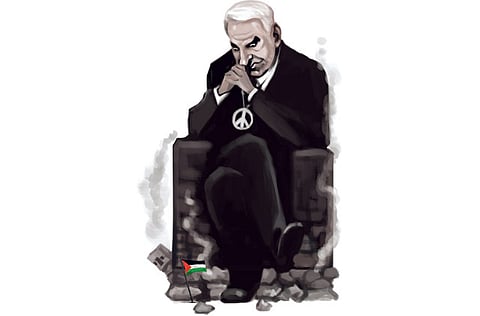Netanyahu is covertly seeking surrender of Palestinians
What Israel has not achieved in the 1947-49 war, its prime minister is trying to do with the 'loyalty' oath

As the early Zionist leaders debated the foundational idea of establishing a Jewish home in Palestine they faced two principle obstacles: First, how to convince sceptical Jews in Europe and elsewhere to support Zionism and its underlying proposition that anti-Semitism is endemic in the gentile world and only a Jewish state can provide protection and assure liberties.
This was especially problematic since many Jews in Western Europe were successfully integrated and had achieved positions of influence and feared that Zionism would jeopardise their recently acquired rights in their native countries.
Secondly, the Zionist leaders had to deal with the extraordinarily daring objective of turning Palestine — a country with an overwhelming Muslim and Christian majority — into not simply a country with a Jewish majority, which was daunting enough, but a country that was ‘as Jewish as England was English'.
The evolution of international relations after the First World War diminished the intractability of the first challenge. The rise of anti-Semitism in fascist Europe, the obsession of Nazism with a ‘final solution' for the Jewish question combined to make Zionism a far more credible quest for salvation and protection for the threatened Jews of Europe.
As for the second obstacle, the early Zionist leaders readily conceded that the objective of establishing a Jewish state in Palestine cannot be achieved without fundamental harm to the rights of the Palestinians. Humanist Zionist leaders argued that such massive violations of the rights of Palestinians were fundamentally incompatible with Jewish values and ideals and threatened to contaminate the democratic values upon which the future Jewish state was supposed to be founded.
Other Zionist leaders, however, argued that in the face of an eternal threat not only to Jewish identity but also to the very existence of Jewish people in increasingly anti-Semitic countries, massive violations of the rights Palestinians was the lesser of two evils.
This view prevailed and Zionist leaders accepted the inevitability of an existential clash with the Palestinians which had to be crushed to allow for the transformation of Palestine from a country with an overwhelming Arab majority into a country as Jewish as England was English.
The Zionist leadership exploited the imminently understandable opposition of the Palestinians to the transformation of their country into a Jewish country, as an excuse to launch the war of conquest, of expulsion and ethnic cleansing in 1947-49.
Militarily, the Zionist armies' war plans were successful, and the Jewish armies came to control not only the half of Palestine that was recommended by the UN as a Jewish state but also more than half of the territories proposed for the Palestinian state.
Ethnic cleansing
But politically and ideologically, the establishment of Israel in 78 per cent of Palestine did not achieve the much coveted goal of a state as Jewish as England was English. A substantial Palestinian minority came under Israeli control and threatened the promise of a Jewish and democratic state. Despite the ethnic cleansing, the expulsion, and the many massacres, the Palestinians refused to be crushed, and Palestinian identity survived to reconstruct its shattered institutions and to challenge inequality and domination.
This explains the extraordinary contradiction inherent in the position of the current Israeli Prime Minister Benjamin Netanyahu. He never tires of proclaiming that he wants peace with the Palestinians when what he evidently wants is surrender. Consider his statement recently in occupied Jerusalem before a group of worldwide Jewish leaders.
He reportedly said that peace must be based on a mutual agreement and that only when the Palestinians accept his demand to recognise Israel as a Jewish state, will they be ready to end the Israeli-Palestinian conflict.
Since Palestinian recognition of Israel as a Jewish state has implications for the rights of the Palestinians expelled in the 1947-49 war and particularly their right of return; and since it also has implications for the right to equality of Palestinians from 1948 areas, Netanyahu is in fact still fighting the 1947-49 war. What Israel failed to achieve by war, Netanyahu is shrewdly seeking to accomplish through ‘peace' negotiations.
For the Palestinians to recognise Israel as a Jewish state essentially means recognising Israel as the state not of its citizens but the state of the Jewish people wherever they may be in the world. Palestinian recognition of that reality is tantamount to accepting the Israeli discriminatory practice of granting political rights to Jews, wherever they may be in the world, while denying the same rights to Palestinians born in Palestine. This essentially means signing away the Palestinian refugees' right of return.
Thus, Netanyahu's demand that the Palestinians recognise Israel as a Jewish state is not only a demand for the complete surrender that the 1947-49 war failed to achieve; it is also an attempt to dispose of the question of refugees — one of the core issues of negotiations — while claiming to negotiate without preconditions.
Finally, total Palestinian surrender is meant to bestow legitimacy on the expulsion, the ethnic cleansing, and the foundational myths of the birth of Israel, while denying the validity of the Palestinian narrative of 1948 as the year of catastrophe.
The loyalty oath, which requires non-Jewish immigrants to pledge allegiance to Israel as a ‘Jewish and democratic state' is an example of the same misplaced urge to resolve a fundamental contradiction, this time through legislative action.
It is clear that Israeli leaders continue to promote ideological convictions that betray a desire to behave exploitatively — as the defiant continuation of colony construction illustrates — and to force Palestinian surrender as the appropriate end to the Israel-Palestine conflict.
Adel Safty is Distinguished Professor Adjunct at the Siberian Academy of Public Administration, Russia. His new book, Might Over Right, is endorsed by Noam Chomsky, and published in England by Garnet, 2009.



